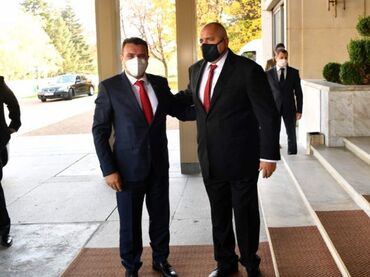By Sinisa Jakov Marusic, Skopje |BIRN
The EU’s Council of Ministers failed to adopt a negotiating framework for North Macedonia [sic] which would allow the start of its much-awaited EU accession talks because of objections from neighbour Bulgaria.

North Macedonia [sic] remains in the waiting room of the European Union after Bulgaria’s objections caused the Council of Ministers to fail to adopt a negotiating framework on Tuesday that would have allowed Skopje to start EU accession talks before the year’s end as previously envisaged.
Bulgarian Foreign Minister Ekaterina Zaharieva told media that her country is ready to give the green light to Albania’s negotiating framework, but not to the one for North Macedonia [sic].
“I expressed the Bulgarian position, so at this phase, we cannot approve the negotiating framework with North Macedonia [sic],” Zaharieva said.
“Bulgaria is open for talks [with North Macedonia [sic]] and I would like to see more efforts being put in the progress of the talks, rather than in the campaign against Bulgaria,” she added.
She said that a candidate country cannot start accession talks if it has unresolved issues with an EU member state.
Bulgaria wants to scrap from the EU negotiating framework the use of the term ‘Macedonian [sic] language’ [which Bulgaria insists is just a dialect of the Bulgarian language].
Bulgaria would like to see the use of the formulation, “the language according to the Constitution” of North Macedonia [sic], which has been used since 1999 strictly in bilateral documents between the two countries.
Bulgaria also insists that North Macedonia [sic] should accept Sofia’s views on certain parts of the two countries’ shared history, most notably the . . . Bulgarian origin of the Ottoman era revolutionary Goce Delcev, who is celebrated as a national hero in both countries.
Sofia also insists that there is no Macedonian [sic] minority in Bulgaria and would like to see Skopje explicitly renounce its existence.
Meanwhile Germany, which currently holds the rotating EU presidency, is expected to exert more effort to resolve the deadlock.
Before Tuesday’s conference of EU ministers, the German Minister for Europe Michael Roth said that both North Macedonia [sic] and Albania should be allowed to launch their talks in tandem by the year’s end.
“It is in EU’s best interest for both countries to start the accession talks as soon as possible,” Roth said in Berlin.
In contrast to Zaharieva’s claims, Roth, whose country has been putting in a lot of diplomatic effort lately to ensure the start of the talks, said that “the accession process must not be a hostage of the bilateral demands of certain member states”.
North Macedonia [sic] in the past few months has said it is ready to talk with Bulgaria to try to find a way forward, but insisted that some of Sofia’s claims touch on identity issues, which by definition are not for politicians to negotiate.
North Macedonia’s [sic] Prime Minister Zoran Zaev has said that efforts for a solution will continue, and that more intensive pushes for a possible breakthrough should be expected in December.
By that time, a joint Bulgaria-North Macedonia [sic] history commission should also convene again to try once more to find a common ground over contested parts of history.
Source: BIRN
Bulgarian Foreign Minister Ekaterina Zaharieva told media that her country is ready to give the green light to Albania’s negotiating framework, but not to the one for North Macedonia [sic].
“I expressed the Bulgarian position, so at this phase, we cannot approve the negotiating framework with North Macedonia [sic],” Zaharieva said.
“Bulgaria is open for talks [with North Macedonia [sic]] and I would like to see more efforts being put in the progress of the talks, rather than in the campaign against Bulgaria,” she added.
She said that a candidate country cannot start accession talks if it has unresolved issues with an EU member state.
Bulgaria wants to scrap from the EU negotiating framework the use of the term ‘Macedonian [sic] language’ [which Bulgaria insists is just a dialect of the Bulgarian language].
Bulgaria would like to see the use of the formulation, “the language according to the Constitution” of North Macedonia [sic], which has been used since 1999 strictly in bilateral documents between the two countries.
Bulgaria also insists that North Macedonia [sic] should accept Sofia’s views on certain parts of the two countries’ shared history, most notably the . . . Bulgarian origin of the Ottoman era revolutionary Goce Delcev, who is celebrated as a national hero in both countries.
Sofia also insists that there is no Macedonian [sic] minority in Bulgaria and would like to see Skopje explicitly renounce its existence.
Meanwhile Germany, which currently holds the rotating EU presidency, is expected to exert more effort to resolve the deadlock.
Before Tuesday’s conference of EU ministers, the German Minister for Europe Michael Roth said that both North Macedonia [sic] and Albania should be allowed to launch their talks in tandem by the year’s end.
“It is in EU’s best interest for both countries to start the accession talks as soon as possible,” Roth said in Berlin.
In contrast to Zaharieva’s claims, Roth, whose country has been putting in a lot of diplomatic effort lately to ensure the start of the talks, said that “the accession process must not be a hostage of the bilateral demands of certain member states”.
North Macedonia [sic] in the past few months has said it is ready to talk with Bulgaria to try to find a way forward, but insisted that some of Sofia’s claims touch on identity issues, which by definition are not for politicians to negotiate.
North Macedonia’s [sic] Prime Minister Zoran Zaev has said that efforts for a solution will continue, and that more intensive pushes for a possible breakthrough should be expected in December.
By that time, a joint Bulgaria-North Macedonia [sic] history commission should also convene again to try once more to find a common ground over contested parts of history.
Source: BIRN




 RSS Feed
RSS Feed